Faculty Appointments & Promotions
New Faculty

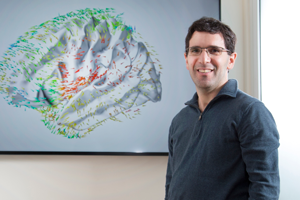
Assistant Professor, Biomedical Engineering PhD,
University of Pennsylvania, 2008; MEng, MIT, 2002;
SB, MIT, 2001
Joshua Jacobs studies how the human brain supports spatial navigation and memory. Jacobs performs this work by studying brain recordings from neurosurgical patients who have electrodes surgically implanted in deep brain structures. He plans on teaching courses in neural data analysis and bioengineering research methods.
Appointments to Endowed Professorships
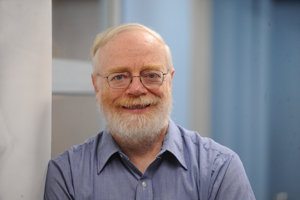
Percy K. and Vida L. W. Hudson Professor of Computer Science
Steven M. Bellovin is one of the world’s leading researchers in computer networks, cybersecurity, and privacy. The Hudson Chair was established by Mr. Hudson, a descendent of Henry Hudson, who graduated from Columbia School of Mines in 1899.
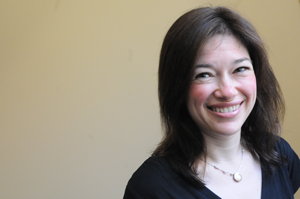
Liu Family Professor of Industrial Engineering and Operations Research
Maria Chudnovsky is an expert in graph theory and a 2012 MacArthur Foundation Fellow. Ming Chung Liu and Yin Zhang P’09, founders of Nine Dragons Paper Holdings, Ltd., the largest producer of containerboard products in China, endowed the Liu Family Professorship.
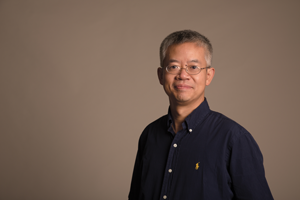
The Fu Foundation Professor of Applied Mathematics
Qiang Du is an applied and computational mathematician internationally recognized as one of the world’s leading researchers in the study of Ginzburg-Landau theory. This professorship was established by the late Z. Y. Fu.
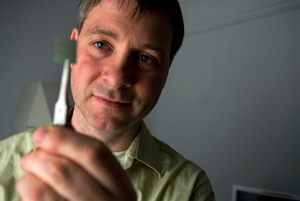
Wang Fong-Jen Professor of Mechanical Engineering (Inaugural)
An innovative researcher and scholar, James Hone has achieved in his work significant breakthroughs in atomically thin two-dimensional materials. This professorship was established by entrepreneur Fermi Wang PhD’91 in honor of his late brother, who earned his MS, MPhil, and PhD in mechanical engineering at Columbia.
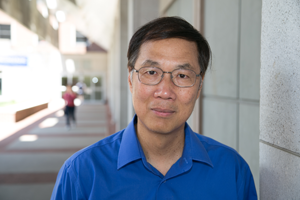
Samuel Y. Sheng Professor of Biomedical Engineering (Inaugural)
Kam W. Leong is a leading international authority on understanding the mechanism of cellular interaction with nanomaterials for drug delivery and regenerative medicine. This chair was established by Mr. Sheng’s daughter, Jean Sheng-Larkin; son, Kent Sheng; and daughter-in-law, Lauren Wong Sheng BS’76. Mr. Sheng ’51 was a distinguished chemical engineer who graduated from Columbia’s master’s program in industrial chemistry.
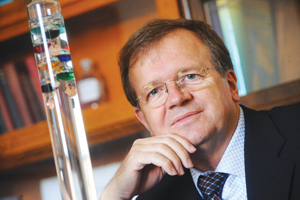
Maurice Ewing and J. Lamar Worzel Professor of Geophysics
Peter Schlosser is a leading earth scientist studying water movement, developing novel instruments and models to understand the effects of the changing hydrosphere on ocean circulation, groundwater flow, and climate. This professorship was established by a gift of the Palisades Geophysical Institute and other donors to honor Ewing and Worzel, two pioneering geophysicists and engineers.
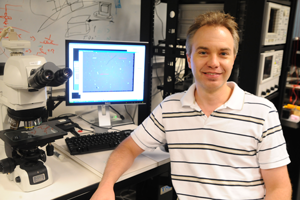
Lau Family Professor of Electrical Engineering (Inaugural)
Kenneth L. Shepard, who holds joint appointments as professor of biomedical engineering and of electrical engineering, is a pioneer in developing systems and applications based on heterogeneously integrating new devices and materials with complementary metal-oxide-semiconductor technology. The Lau Family Professorship was established by Engineering parents Lee and Margaret Lau to support research and teaching at the School. Mr. Lau is a partner and cofounder of Alignvest and founder of ATI Technologies.
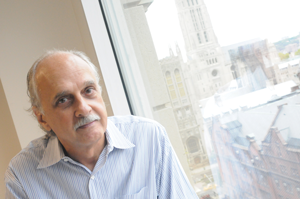
Edwin Howard Armstrong Professor of Electrical Engineering
Yannis Tsividis is a leader in the development of analog and mixed-signal integrated circuits across a variety of platforms. The Armstrong Professorship was endowed in part by Mrs. Marion Armstrong to honor her husband, a member of the Class of 1913, who was the inventor of FM radio, among many other advances in radio technology, and a Columbia faculty member.
Promotion to Tenure
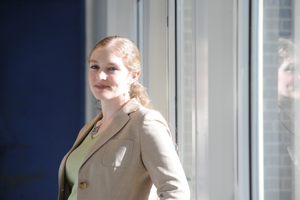
Chemical Engineering
Associate Professor V. Faye McNeill investigates the profound effect that atmospheric aerosol particles and ice in the environment have on Earth’s climate and atmospheric composition. She and her team perform laboratory and modeling studies of the chemistry and physics of atmospheric aerosols and ice in the environment, with a special focus on heterogeneous chemistry and interfaces. The results of these studies are increasing our understanding of the effects of human activities on the environment and are helping to improve the predictive power of atmospheric chemistry and climate models. McNeill is a coeditor of Atmospheric Chemistry and Physics, vice chair of the AIChE Environmental Division, and a recipient of a National Science Foundation CAREER Award. Her latest publication, “Aqueous organic Chemistry in the Atmosphere: Sources and Chemical Processing of organic Aerosols,” was a feature article in Environmental Science & Technology.
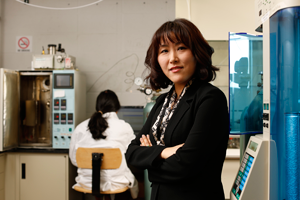
Earth and Environmental Engineering
Ah-Hyung (Alissa) Park is the Lenfest Chair in Applied Climate Science of Earth and Environmental Engineering and Chemical Engineering and Interim Director of the Lenfest Center for Sustainable Energy at the Earth Institute. She focuses on carbon capture, utilization, and storage (CCUS) and sustainable energy conversion pathways with emphasis on innovative materials and reaction schemes based on the principles of particle technology and advanced carbonate chemistry. Park’s group is researching fundamental studies of CCUS by developing nanoscale materials for coupled Co2 capture and conversion and better carbon storage via carbon mineralization. Founded on these new materials and reaction schemes, her team is also working on fuel synthesis pathways using unconventional energy sources, while minimizing environmental impacts. Park is the recipient of an NSF CAREER Award and James Lee Young Investigator Award.
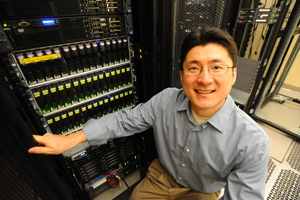
Computer Sciece
Associate Professor Junfeng Yang’s research centers on making reliable and secure software systems by creating effective tools that advance that goal. Current projects involve efficient and reliable multithreading, tools for cloud computing, and systems support for reliability, security, and privacy. As codirector of the Software Systems Laboratory, he works with a research team to pursue all aspects of the design, implementation, analysis, and evaluation of software systems at all scales, from handheld devices to cloud computing data centers. Yang is a recipient of a Sloan Fellowship, an Air Force office of Scientific Research Young Investigator Award, and a National Science Foundation CAREER Award. He recently published the paper “Determinism Is Not Enough: Making Parallel Programs Reliable with Stable Multithreading” in Communications of the ACM.
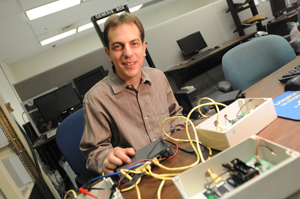
Electrical Engineering
Associate Professor Gil Zussman focuses on the area of networking, and, in particular, on wireless, mobile, and resilient networks. Among his projects is the multi-PI Energy Harvesting Active Network Tags (EnHANTs) project where the objective is to design small, flexible, and energetically self-reliant tags that can be attached to objects that are traditionally not networked. A network of these tags can support novel tracking applications and become one of the enablers for the Internet of Things. other projects focus on designing scheduling and resource allocation algorithms for emerging wireless technologies, improving the resilience of communication and power networks to large-scale attacks, and designing cross-layered algorithms for dynamic optical networks. Zussman is a recipient of a few best paper awards, the Fulbright Fellowship, two Marie Curie fellowships, a Defense Threat Reduction Agency Young Investigator Award, and an NSF CAREER Award.
Promotion to Associate Professor
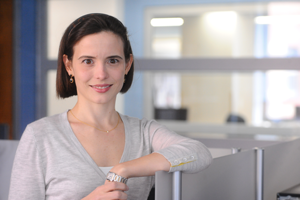
Computer Science
Martha Kim leads the ARCADE Lab at the Engineering School. Her research interests are in computer architecture, parallel programming, compilers, and low-power computing. Kim’s work has explored low-cost chip manufacturing systems, reconfigurable communication networks, and fine-grained parallel application profiling techniques. Currently, she is focusing on hardware and software techniques to improve the usability of hardware accelerators as well as data-centric accelerator design. Kim is the recipient of a 2013 NSF CAREER award and the 2013 Rodriguez Family Award in recognition of the research achievements of underrepresented junior faculty at Columbia.
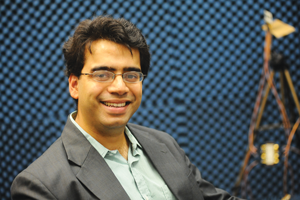
Electrical Engineering
Harish Krishnaswamy’s research interests broadly span integrated devices, circuits, and systems for a variety of RF and mmWave applications. His current research efforts are focused on silicon-based mmWave PAs, sub-mmWave circuits and systems, and reconfigurable/broadband RF transceivers for cognitive and software-defined radio. Krishnaswamy directs the Columbia high-Speed and Mm-wave IC (CoSMIC) Lab and serves as a member of the Technical Program Committee (TPC) of several conferences, including the IEEE RFIC Symposium. He is the recipient of a 2014 IBM Faculty Award, a 2011 Defense Advanced Research Projects Agency (DARPA) Young Faculty Award, the IEEE International Solid-State Circuits Conference (ISSCC) Lewis Winner Award for outstanding Paper in 2007, and the Best Thesis in Experimental Research Award from the USC Viterbi School of Engineering in 2009.
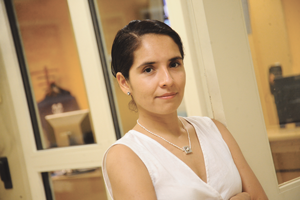
Industrial Engineering and Operations Research
Mariana Olvera-Cravioto’s research interests are in applied probability, in particular, in asymptotic analysis involving heavy-tailed distributions. Her current work is focused on the analysis of information ranking algorithms and their large-scale behavior, which is closely related to the study of the asymptotic properties of solutions to certain stochastic recursions, in particular, weighted branching processes. She also is interested in the analysis of queueing networks with parallel servers such as those encountered in cloud-computing platforms. other research areas include stochastic processes, queueing theory, power-law graphs (e.g., social networks), large deviations, and simulation.
